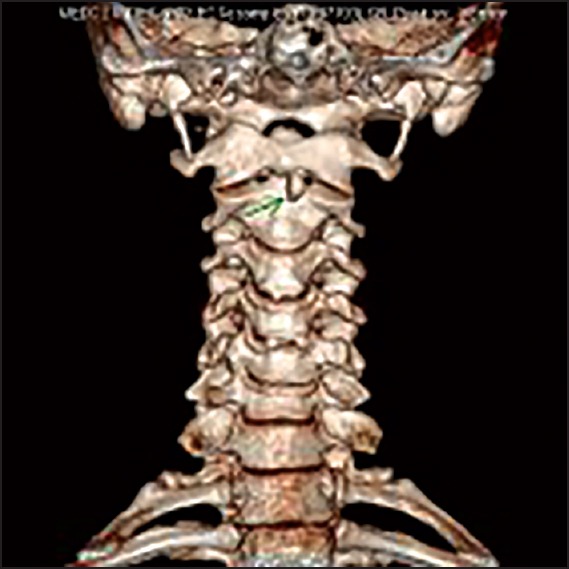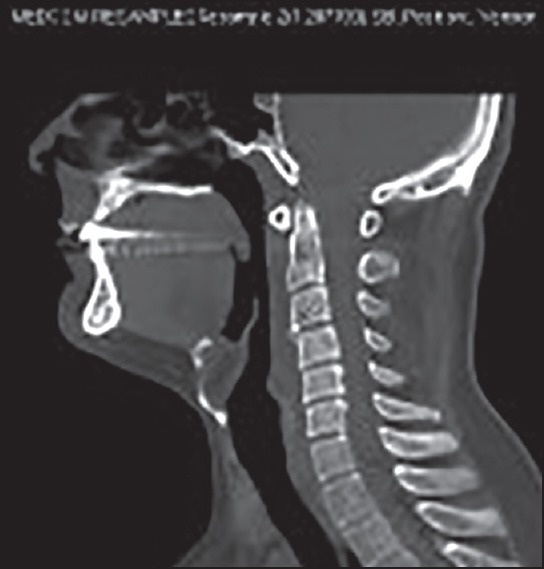Sir,
Retropharyngeal calcific tendinitis (RCT), which is a little known but not an uncommon condition, should be considered as a differential diagnosis of neck pain.[1,2] Here, we present two cases of RCT admitted to our emergency department (ED) with neck pain.
A 47-year-old woman was presented to the ED with sore throat and posterior neck pain for 2 days. Physical examination was normal. Her computed tomography (CT) images revealed 6-7 mm calcification anterior to C2 vertebra [Figure 1]. She has completely improved with 7 days of nonsteroidal anti-inflammatory drug (NSAID) therapy.
Figure 1.

3D CT image showed calcification of the longus colli muscle at the level of second cervical vertebra (arrow). 3D: Three dimensional; CT: Computed tomography
A 42-year-old man was admitted to the ED with severe left and posterior neck pain, exacerbated by movement and food intake for 3 days. The patient exhibited a sore throat and fever (37.8°C). In blood examination, the only abnormal item was white blood cells (WBC) (15,800/μl). CT images revealed C3-C4 anterior longitudinal ligament calcification, and magnetic resonance imaging (MRI) demonstrated retropharyngeal prevertebral soft tissue edema and inflammation [Figure 2]. Because of the nontypical localization of the prevertebral calcification, retropharyngeal drainage was planned to rule out abscess. There was no material drained with the procedure. The cultures and biopsies did not show any infection. Hence, patient was discharged with medical treatment.
Figure 2.

CT image demonstrated calcification in the region of prevertebral area of C3-C4 vertebra. CT: Computed tomography
RCT is a benign, self-limited, and inflammatory condition of the longus colli tendon thought to be a form of calcium hydroxyapatite deposition disease. It is characterized by an acute onset of severe neck pain, odynophagia, and a painful restriction of neck movement. This disease mostly affects adults between 30- and 60-years old as our cases. The calcifications are usually present in the superior oblique portion of the longus colli muscle at the C1-C2 levels although a C5-C6 level has also been described. The most common treatment methods entailed the use of NSAID, steroids, or opiate analgesics.[3]
The presentation of this disease may be similar to more serious conditions such as retropharyngeal abscess (RPA), meningitis, cervical myopathy, and traumatic injury. It is important to note that the relatively benign condition of RCT is often misdiagnosed with RPA in 75% of patients. Patients with RPA usually present with neck pain, sore throat, dysphagia, or odynophagia that is also common in RCT.[4] RCT is a benign self-limiting disease that rarely requires admission, whereas RPA is associated with a high morbidity that may require antibiotics and surgical drainage for the treatment.[5] The diagnosis was also delayed in our second case, which also underwent surgical drainage to exclude RPA.
REFERENCES
- 1.Kanzaria H, Stein JC. A severe sore throat in a middle-aged man: Calcific tendonitis of the longus colli tendon. J Emerg Med. 2011;41:151–3. doi: 10.1016/j.jemermed.2008.01.016. [DOI] [PubMed] [Google Scholar]
- 2.Haran JP, Pezzella L. A case of neck pain: The presentation of Chairi 1 malformations in children. J Emerg Trauma Shock. 2014;7:32–4. doi: 10.4103/0974-2700.125636. [DOI] [PMC free article] [PubMed] [Google Scholar]
- 3.Kusunoki T, Muramoto D, Murata K. A case of calcific retropharyngeal tendinitis suspected to be a retropharyngeal abscess upon the first medical examination. Auris Nasus Larynx. 2006;33:329–31. doi: 10.1016/j.anl.2005.11.014. [DOI] [PubMed] [Google Scholar]
- 4.Park R, Halpert DE, Baer A, Kunar D, Holt PA. Retropharyngeal calcific tendinitis: Case report and review of the literature. Semin Arthritis Rheum. 2010;39:504–9. doi: 10.1016/j.semarthrit.2009.04.002. [DOI] [PubMed] [Google Scholar]
- 5.Gabra N, Belair M, Ayad T. Retropharyngeal calcific tendinitis mimicking a retropharyngeal phlegmon. Case Rep Otolaryngol 2013. 2013 doi: 10.1155/2013/912628. 912628. [DOI] [PMC free article] [PubMed] [Google Scholar]


